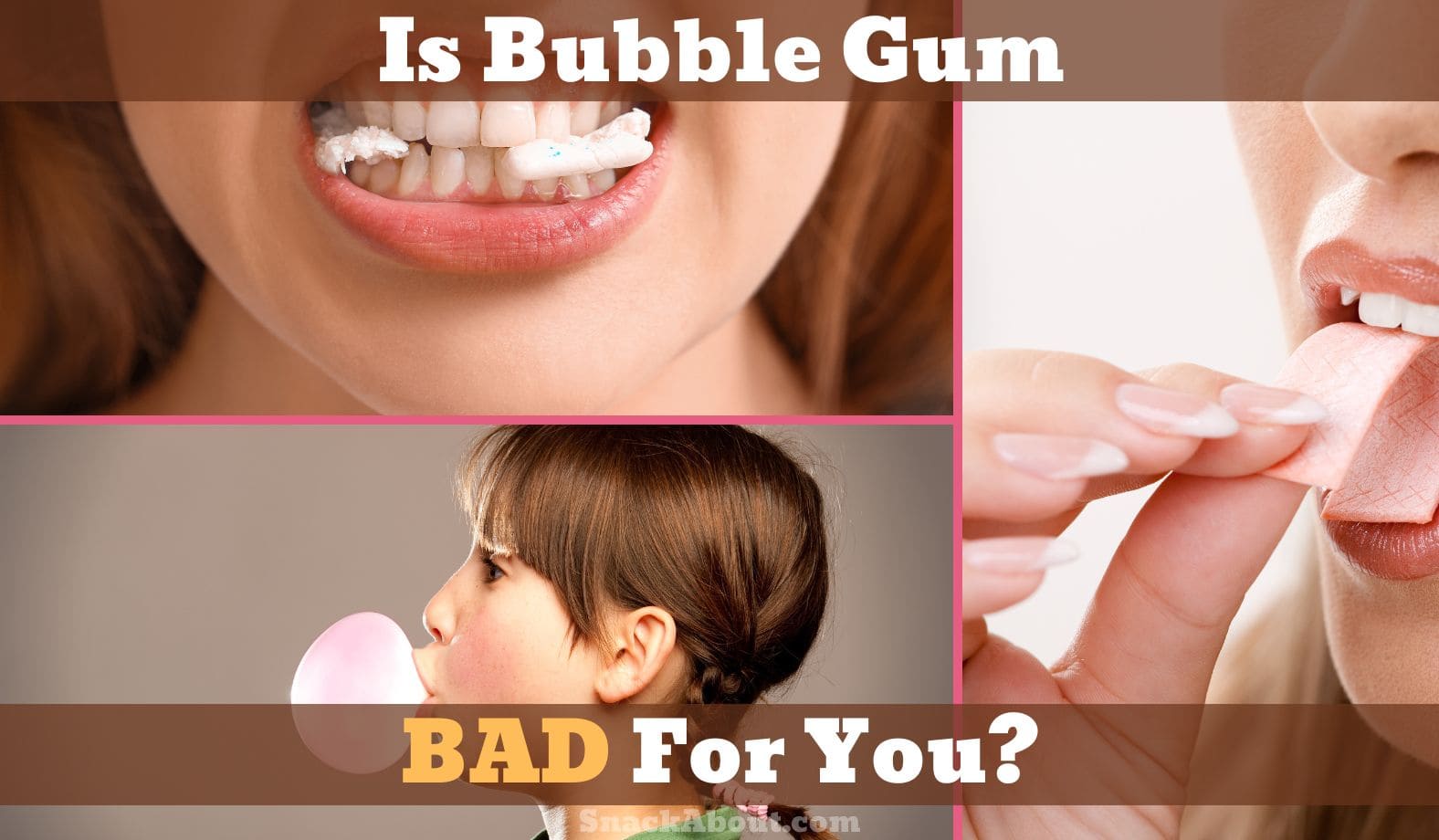Contents
Is Bubble Gum or Chewing Gum Bad for You?
Yes, it’s true that chewing gum is bad for you. It can cause several health issues when done frequently.
Here’s several reasons why regular sweetened bubble gum or chewing gum can be somewhat unhealthy:
- Chewing gum with sugar promotes tooth decay. The sugar released when chewing can react with bacteria present in plaque resulting in the production of acids that destroy tooth enamel.
- For individuals with dental fillings, it’s advisable to avoid chewing gum frequently. That is because some fillings contain small quantities of mercury. Frequent chewing can erode the fillings resulting in the release of mercury. Though such amounts of mercury are not harmful, it is best to be cautious.
- People with ear or jaw health problems can make them worse or at least aggravate their discomfort by chewing gum.
Is Gum Good for Your Jaw?
Despite what many of us may think, the truth is that chewing gum does not benefit your jaws; it instead increases the risk of developing jaw disorders.
The temporomandibular joints facilitate jaw movement, thus making chewing possible. The purpose of chewing is to break down food into smaller particles that can pass through the esophagus without risk of causing choking.
The problem is that chewing gum contradicts that role since gum does not break down which means an unnaturally prolonged movement at the temporomandibular joints (your jaw joints). Moreover, chewing gum exerts an unnecessary force on the joints, the muscles around them, and your teeth.
Consequently, you can experience headaches, popping or clicking while chewing and talking, jaw and neck pain, and restricted jaw movement.
Such issues are often symptoms of temporomandibular disorder (TMJ), a chronic and painful condition that affects the jaws. Therefore, if you experience any of the symptoms mentioned earlier, you should reduce how often you chew gum.
People who’ve already been diagnosed with TMJ should avoid chewing gum altogether.
What Type of Gum Should You Choose for the Best Health?
The best types of gum for your health are those that are considered sugar-free, especially those with all-natural sugar substitutes. Sugarless gums contain less than 0.5 grams of sugar per stick and use alternative sweeteners that don’t promote plaque and tooth decay.
Some examples of alternative sweeteners in sugar free chewing gum include:
- Saccharin
- Xylitol
- Maltitol
- Sucralose
However, since not everyone has the time to read through a gum packet to determine the type of sweetener used, you can look for the American Dental Association (ADA) seal on the package. The seal proves ADA researchers scrutinized the products’ ingredients and found them sugar-free.
Some of the benefits of enjoying sugar-free gum include:
- Increased saliva production: Excess saliva can help wash away food particles lodged between teeth and on gums and neutralize acids that cause tooth decay hence improving dental hygiene.
- Curb dry mouth: Dry mouth is a condition characterized by low production of saliva that can cause bad breath. Chewing gum helps increase saliva production, hence momentarily ending dry mouth.
- Relieving nausea: Saliva production during chewing can mitigate nausea.
- Relieve acid reflux symptoms: Gastroesophageal reflux disease is a condition that causes stomach acid to flow back into the esophagus, causing acid reflux. Saliva produced during chewing helps neutralize the stomach acid, relieving symptoms.
If you’re concerned about your health, I recommend gum with Xylitiol as it’s safe and in even beneficial in fighting cavities due to sugar or mouth plaque.
Why Is Xylitol Especially Good for Your Teeth?
Xylitol is good for your oral health since it helps stop the development of cavities. Cavity development relies on specific bacteria in the mouth and sugar. When the two react, they release acid that erodes tooth enamel.
However, xylitol gum hinders the growth of said bacteria, thus removing one of the mediums necessary for acid production that destroys enamel. Xylitol is also a natural sweetener in case you want to avoid artificial flavoring or chemicals, too!
Does Chewing Gum Make You Hungrier?
Chewing gum does not make you hungrier; however, it will influence your eating habits in other ways. Chewing gives your body the impression that you are eating, releasing stomach acid, other acids, and enzymes to digest the non-existent food.
The release of said substances causes intestinal issues like bloating that can lower your appetite since it makes you feel full.
Therefore, frequent chewing can cause you to reduce the number of meals and snacks you consume throughout the day since it suppresses your appetite. However, chewing does not necessarily lower the amount of food consumed.
You may eat less frequently due to chewing but you’re also more likely to consume larger helpings when you eventually do eat. Something to look out for, obviously!
Does Swallowing Gum Cause Intestinal Problems?
Most people have swallowed gum at least once, but it is very rare to hear cases of people experiencing intestinal problems. Most of the ingredients of bubble gum are digestible, however, the main ingredient, the gum base, is not digestible.
Swallowed bubble gum rarely causes intestinal problems because the body treats it like other indigestible materials. Swallowed gum will pass through the intestinal tract mostly intact and be expelled from the body during excretion.
It’s very similar to what happens with unpopped popcorn kernels you’ve eaten.
However, there are rare cases of people experiencing some discomfort after swallowing gum. That’s pretty unusual – for example, among people who swallow large quantities of gum either over a short time or as one large piece.
The result is usually a blockage in the intestinal tract that can cause abdominal pain, vomiting, and constipation. It’s usually something that will pass with time though. If the situation doesn’t correct itself, you should consider seeing a doctor to determine how bad the blockage is.
In extraordinary cases patients may need surgery to unblock the digestive tract. By that point, however, you’d be extremely uncomfortable and you’d know there’s a major problem and need medical care.




